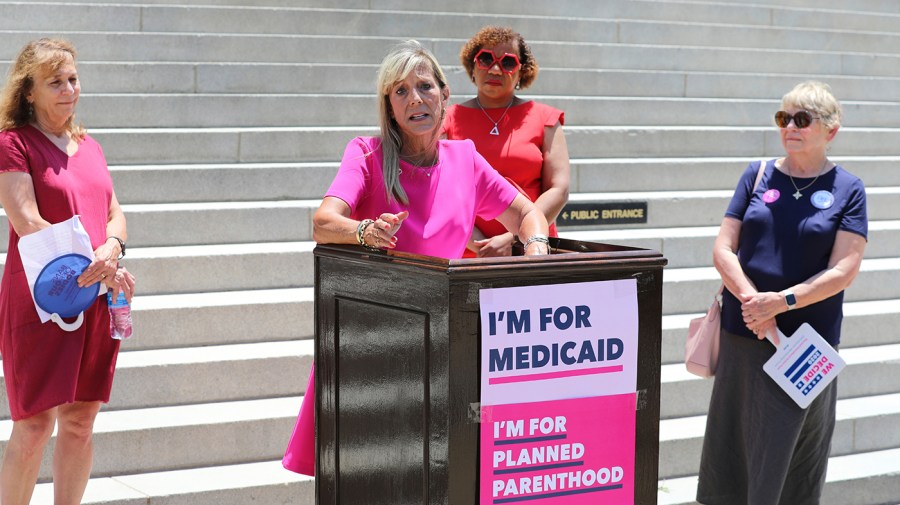Reproductive rights advocates are reeling from Thursday’s Supreme Court ruling in favor of South Carolina in a legal case to block Medicaid funding for Planned Parenthood, which they fear will give other states the green light to do the same.
“Today’s decision is a grave injustice that strikes at the very bedrock of American freedom and promises to send South Carolina deeper into a health care crises,” said Paige Johnson, president and CEO of Planned Parenthood South Atlantic.
“Twice, justices of this court denied to even hear this case because Gov. McMaster’s intent is clear: weaponize anti-abortion sentiment to deprive communities with low incomes to basic health care,” she continued, mentioning South Carolina Gov. Henry McMaster (R).
The case was not about abortion but about whether Medicaid beneficiaries have the right to choose their preferred health provider and sue if they cannot.
Under the law, anyone who receives health insurance through Medicaid can receive care from any qualified and willing provider.
Public health funds do not typically pay for abortion care. But the ruling means that Medicaid patients in South Carolina will no longer be able to use their health insurance to pay for birth control, cancer screenings, STI testing and treatment, and other preventative health care offered at Planned Parenthood clinics.
While the ruling only applies in South Carolina, reproductive rights groups believe elected officials in other states will use the case as a template to restrict health care access.
Missouri, Arkansas and Texas have already blocked Planned Parenthood from accepting Medicaid patients, and advocates expect other Republican-led states to follow suit.
“As extremists in every branch of our government are targeting Planned Parenthood and attempting to strip millions of Americans of the care their health centers provide, this is nothing more than a politically-motivated green light to anti-abortion politicians,” Reproductive Freedom Caucus co-chairs Reps. Diana DeGette (D-Colo.) and Ayanna Pressley (D-Mass.) said in a statement.
The Supreme Court decision comes as Planned Parenthood faces losing federal funding in the Republicans’ reconciliation bill. At least 200 Planned Parenthood clinics will be at risk of closing if the bill passes as is in the Senate, according to the organization.
Anthony Wright, the executive director of the consumer health advocacy group Families USA, agreed that the move will likely serve as a green light for other states to try to impose similar restrictions.
“The Court has now given a green light to states to impose even more harmful barriers to care,” he said in a statement. “This ruling will make it more difficult for people to access the care that they need, allowing politicians and courts to insert themselves into personal health care decisions.”
The Center for Reproductive Rights said in a statement it believes the ruling opens the door for other Medicaid abuses by state officials who want to revoke funding to qualified clinics for other ideological reasons, like if they provide LGBTQ-specific health care or serve immigrant communities.
The center stressed the ruling will immediately impact low-income Americans.
Roughly 72 million low-income Americans receive health insurance through Medicaid, according to the most recent enrollment numbers.
And more than 1.3 million South Carolinians — or 20 percent of the state — are enrolled in the program, according to the health policy nonprofit KFF.
“Today’s decision favors extremists who’d rather let someone die of cancer than let them get a cancer screening at a Planned Parenthood,” said Nancy Northup, president and CEO of the Center for Reproductive Rights. “The Supreme Court overrode what the Medicaid law requires and every patient wants: the ability to choose their trusted health care provider.”
Northup added that the ruling will put “fuel on the fire” on Republican lawmakers’ multiyear effort to deny Medicaid patients access to non-abortion services at Planned Parenthood.
Advocates highlighted that the ruling will also disproportionately impact communities of color in the state — and potentially across the country. Out of the roughly 72 million Americans on Medicaid more than half are people of color, with Black and Hispanic Americans disproportionately enrolled in the program.
“Today’s harmful decision from the Supreme Court is a direct attack Black women, girls and gender-expansive people who rely on Planned Parenthood for life-saving health care services, said Regina Davis Moss, president of In Our Own Voice, a reproductive rights nonprofit that highlights Black health experiences.
“This case was never about abortion, and now this ruling will have devastating consequences for the millions of Americans who will lose access to reproductive health care.”
Moss added that Medicaid pays for almost two-thirds of births among Black mothers and insures more than half of Black girls in the U.S.
Meanwhile, some anti-abortion groups lauded the court’s decision, with the president of Susan B. Anthony Pro-Life America, Marjorie Dannenfelser, calling it a major step toward ending Planned Parenthood’s “taxpayer-funded gravy train.”
“By rejecting Planned Parenthood’s lawfare, the Court not only saves countless unborn babies from a violent death and their mothers from dangerously shoddy ‘care,’ it also protects Medicaid from exposure to thousands of lawsuits from unqualified providers that would jeopardize the entire program,” said Katie Daniel, director of legal affairs at Susan B. Anthony Pro-Life America.

